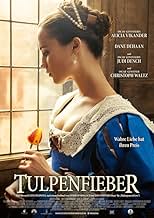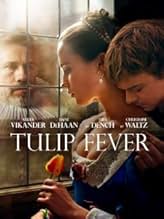IMDb-BEWERTUNG
6,2/10
23.986
IHRE BEWERTUNG
Ein Künstler verliebt sich in eine junge verheiratete Frau, als er während des Tulpenfiebers im Amsterdam des 17. Jahrhunderts den Auftrag erhält, ein Porträt von ihr zu malen.Ein Künstler verliebt sich in eine junge verheiratete Frau, als er während des Tulpenfiebers im Amsterdam des 17. Jahrhunderts den Auftrag erhält, ein Porträt von ihr zu malen.Ein Künstler verliebt sich in eine junge verheiratete Frau, als er während des Tulpenfiebers im Amsterdam des 17. Jahrhunderts den Auftrag erhält, ein Porträt von ihr zu malen.
- Auszeichnungen
- 1 Nominierung insgesamt
Richard Alan Reid
- Bidder 1
- (as Richard Reid)
Empfohlene Bewertungen
How could such a beautiful looking movie fall so flat? Sumptuous filming, a stellar cast, with brilliant period sets and costumes are not enough to disguise the fact that Tulip Fever (2017) drowns under the weight of its own plot contrivance and melodramatic performances.
Set in 17th Century Amsterdam, it tells the story of an orphan who "arrived barefoot and left in a carriage". Selected to marry for her great beauty, Sophia's (Alicia Vikander) sole purpose is to bear a child for wealthy merchant Cornelius (Christopher Waltz) whose first marriage was barren. Cornelius commissions struggling artist Jan (Dane DeHaan) to paint their portrait to celebrate his wealth and her beauty but the artist immediately falls under her spell. While the affair progresses, her maidservant Maria (Holliday Grainger) falls pregnant to a fishmonger and the two women concoct a subterfuge whereby Sophia pretends to be pregnant to keep Maria's secret. As a background sub-plot, Jan seeks his fortune in the over-heated tulip market by purchasing the rarest of tulip specimens from an imperious nun (Judi Dench). Melodrama turns into farce as the multiple narratives interweave, tighten, yet ultimately go nowhere.
High visual production values do not make up for story implausibility. The months of unsuccessful mating between Cornelius and Sophia is portrayed as a bawdy comedy of nightly rituals where Cornelius struggles to perform his marital duties. The affair under her husband's nose, the fake pregnancy, and fake birth are all ludicrously implausible. The background tale of wild speculations on the fickle tulip market is a distraction rather than necessary for Jan's predictable investment outcomes. The script sounds unnatural and dialogue is delivered unconvincingly: many lines are spoken across class boundaries in ways that would have been unimaginable in that era. With a top- shelf cast, the acting is flawless although Alicia Vikander stands out for the way she plays the same Alicia Vikander that we have seen in several films. The chemistry with both husband and lover is of the barely flickering variety, and her impersonation of Mona Lisa is, as always, impeccable.
Does the film's ending justify the effort? Disappointingly, no. The fate of all the characters is disconnected from the narrative flow and the storyline threads remain dangling in the wind. For some audiences, the beauty of this production will be worth the commitment. However, after an hour and forty-five minutes, all we learn is that great beauty, wealth, greed, and deception, do not bring happiness; nor do aesthetics alone make a great movie.
Set in 17th Century Amsterdam, it tells the story of an orphan who "arrived barefoot and left in a carriage". Selected to marry for her great beauty, Sophia's (Alicia Vikander) sole purpose is to bear a child for wealthy merchant Cornelius (Christopher Waltz) whose first marriage was barren. Cornelius commissions struggling artist Jan (Dane DeHaan) to paint their portrait to celebrate his wealth and her beauty but the artist immediately falls under her spell. While the affair progresses, her maidservant Maria (Holliday Grainger) falls pregnant to a fishmonger and the two women concoct a subterfuge whereby Sophia pretends to be pregnant to keep Maria's secret. As a background sub-plot, Jan seeks his fortune in the over-heated tulip market by purchasing the rarest of tulip specimens from an imperious nun (Judi Dench). Melodrama turns into farce as the multiple narratives interweave, tighten, yet ultimately go nowhere.
High visual production values do not make up for story implausibility. The months of unsuccessful mating between Cornelius and Sophia is portrayed as a bawdy comedy of nightly rituals where Cornelius struggles to perform his marital duties. The affair under her husband's nose, the fake pregnancy, and fake birth are all ludicrously implausible. The background tale of wild speculations on the fickle tulip market is a distraction rather than necessary for Jan's predictable investment outcomes. The script sounds unnatural and dialogue is delivered unconvincingly: many lines are spoken across class boundaries in ways that would have been unimaginable in that era. With a top- shelf cast, the acting is flawless although Alicia Vikander stands out for the way she plays the same Alicia Vikander that we have seen in several films. The chemistry with both husband and lover is of the barely flickering variety, and her impersonation of Mona Lisa is, as always, impeccable.
Does the film's ending justify the effort? Disappointingly, no. The fate of all the characters is disconnected from the narrative flow and the storyline threads remain dangling in the wind. For some audiences, the beauty of this production will be worth the commitment. However, after an hour and forty-five minutes, all we learn is that great beauty, wealth, greed, and deception, do not bring happiness; nor do aesthetics alone make a great movie.
Great cast! Fine Acting! Glossy cinematography! Terrific sets! Excellent costuming! Even an intriguing first half of the film! Yet, ultimately Justin Chadwick's historical romantic drama concerning a 17th-century painter in Amsterdam who falls in love with a married woman whose portrait he has been commissioned to paint, during the period known as "Tulip Mania", fails due to its implausible, improbable, narrative outcomes.
It just goes to show that films left on the studio shelves for 3 years after being completed, before being released, as was the case with Tulip Fever, are usually top - shelved for good reason. In this case the film seems to have suffered through a combination of script and editing deficiencies and some poor directorial choices. It results in a movie that doesn't seem to know whether it wants to be some sort of comedy - drama, or straight out melodrama in corsets.
Whether due to editing or some other production choice, nothing much is ever made really clear. The titular, historically authentic,Tulip Fever itself is barely sketched out and then only against the incessant noise and rowdy crowds of Amsterdam's flower markets. Early in the film a quite close and friendly relationship is hinted at between the 2 female leads, Sophia (Alicia Vikander), a wealthy merchant's unhappy young wife and her maidservant, the more earthy and world - wise Maria (Holiday Grainger). Their love - lives are compared and contrasted with Sophia clearly ensnared in a loveless arranged marriage. But this thread is never really consolidated.
Instead we are served up a mish - mash of multiple storylines concerning fake and real pregnancies, suspicious lovers and various characters seeking their fortunes through investment in an over - heated tulip market. It all ends up being ludicrously implausible and both unfunny and undramatic, with a tacked on, unconvincing conclusion. What a waste!
I've given it a 6, because I'm sure there will be some, who like me, appreciate historical films such as this, with obviously high production values. There's no getting around the fact that Tulip Fever looks good. And Alicia Vikander is perfect as Sophia, plucked from obscurity in an orphanage and selected to marry for her great beauty. Similarly, Grainger succeeds as the pragmatic, Maria, who is anything but a dullard, or your conventional notion of a put upon servant. But these positives can't disguise that Tulip Fever ends up looking and sounding like a completely miscalculated opportunity, rather than a significantly interesting, period drama.
It just goes to show that films left on the studio shelves for 3 years after being completed, before being released, as was the case with Tulip Fever, are usually top - shelved for good reason. In this case the film seems to have suffered through a combination of script and editing deficiencies and some poor directorial choices. It results in a movie that doesn't seem to know whether it wants to be some sort of comedy - drama, or straight out melodrama in corsets.
Whether due to editing or some other production choice, nothing much is ever made really clear. The titular, historically authentic,Tulip Fever itself is barely sketched out and then only against the incessant noise and rowdy crowds of Amsterdam's flower markets. Early in the film a quite close and friendly relationship is hinted at between the 2 female leads, Sophia (Alicia Vikander), a wealthy merchant's unhappy young wife and her maidservant, the more earthy and world - wise Maria (Holiday Grainger). Their love - lives are compared and contrasted with Sophia clearly ensnared in a loveless arranged marriage. But this thread is never really consolidated.
Instead we are served up a mish - mash of multiple storylines concerning fake and real pregnancies, suspicious lovers and various characters seeking their fortunes through investment in an over - heated tulip market. It all ends up being ludicrously implausible and both unfunny and undramatic, with a tacked on, unconvincing conclusion. What a waste!
I've given it a 6, because I'm sure there will be some, who like me, appreciate historical films such as this, with obviously high production values. There's no getting around the fact that Tulip Fever looks good. And Alicia Vikander is perfect as Sophia, plucked from obscurity in an orphanage and selected to marry for her great beauty. Similarly, Grainger succeeds as the pragmatic, Maria, who is anything but a dullard, or your conventional notion of a put upon servant. But these positives can't disguise that Tulip Fever ends up looking and sounding like a completely miscalculated opportunity, rather than a significantly interesting, period drama.
I loved it. After reading the reviews of other users, I had no expectations from the movie. But, I was very surprised after I finished watching the film that I actually thoroughly enjoyed it. The plot itself is very intriguing and forces the viewer to enter a game of guesses and speculations on what will the characters dare to do next. It's a wonderfully playful and thrilling love story that I would recommend everyone to go and watch.
Countless reviewers will address this movie saying it was dismal and thin. They say the plots and subplots were disconnected and on loosely held together by a weak premise.
I thought the opposite. I chose to watch it anyway because of the cast. I'll admit none of them had a remarkable performance, award winning or otherwise. I think they were all fairly balanced without overselling any particular role. While the story centered around Sophia primarily, you could sense the desire, intrigue and frustration of the other characters. I went into it with no knowledge of the plot, tulipmania, or even the actual setting. About halfway through I began to get the feeling, "I see what going on here. This plots been done and redone." I thought I knew what to expect. At times I was right, but at others, grossly wrong. I thoroughly enjoyed this movie and would enjoy watching it again. The plot moves so quick at times I know I'll see more next time.
I've told you what I thought. Don't let anyone tell you what to think. Watch it and make up your own mind. I've seen far worse movies get higher praise.
I thought the opposite. I chose to watch it anyway because of the cast. I'll admit none of them had a remarkable performance, award winning or otherwise. I think they were all fairly balanced without overselling any particular role. While the story centered around Sophia primarily, you could sense the desire, intrigue and frustration of the other characters. I went into it with no knowledge of the plot, tulipmania, or even the actual setting. About halfway through I began to get the feeling, "I see what going on here. This plots been done and redone." I thought I knew what to expect. At times I was right, but at others, grossly wrong. I thoroughly enjoyed this movie and would enjoy watching it again. The plot moves so quick at times I know I'll see more next time.
I've told you what I thought. Don't let anyone tell you what to think. Watch it and make up your own mind. I've seen far worse movies get higher praise.
A love story (actually two of them) play out amid the backdrop of the famous tulip mania of Amsterdam, ca 1634. Both love stories hinge on wild improbabilites that are almost laughable. The story is based on a novel so we can perhaps blame it on that. Regardless, the movie is vastly entertaining (but not in the so-bad-it's-good category. There is a lot to like.) As we are told Tulip trading was rampant and "fortunes were won and lost" all because of a "beautiful flower."
Sophia (Alicia Vikander) is an orphan under the care of a convent that specializes in providing care and education for such unfortunates. She is appropriated by a wealthy nobleman (Cornelius Sandvoort) in Amsterdan who wants to marry and sire an heir. Historical context---keep in mind that Henry was fairly recent history at this time---can make this a daunting task for a young lady but Cornelius turns out to be a saint, an anomaly for one so powerful in such times. He has a love for his young wife and by and by he hires a handsome young painter (Dane DeHann, who bears a rather strong resemblance to a young Leonardo DeCaprio) to paint a portrait of he and his wife. Uh oh.
Meanwhile Sophia's servant, Maria (Holliday Grainger) is carrying on with a fishmonger (James Dryden), who wants to marry her and due to his low station tries to strike it rich with tulips. Complications ensue whereby Sophia and Maria concoct a scheme which might be termed the Mission Impossible of 1634 that strains credulity but can be overlooked with effort. Alica Vikander, the main heroine, agrees to some clandestine sittings for her young painter and in the doing is mind-stopping beautiful. (Vermeer would have loved her. She would not need golden earrings). What happens besides sitting and painting in these sessions is easily surmised.
Judi Dench is the Mother Superior (or whatever her title might be) but not per the usual, she is capable of the nod and the wink and can speak quite plainly not to mention her business acumen. You see, the convent grows, buys, and sells tulips and they need a shrewd-y to handle all that ... Judi does just this with aplomb all the while maintaining at least an appearance of piety. (Although if I remember correctly she actually hits somebody over the head with something.)
Another character is old Amersterdam, or the depiction of it. Swarming denizens bustle about in droves along streets and waterfront fulfilling the need for historcal context (along with the tulips, of course).
Sophia (Alicia Vikander) is an orphan under the care of a convent that specializes in providing care and education for such unfortunates. She is appropriated by a wealthy nobleman (Cornelius Sandvoort) in Amsterdan who wants to marry and sire an heir. Historical context---keep in mind that Henry was fairly recent history at this time---can make this a daunting task for a young lady but Cornelius turns out to be a saint, an anomaly for one so powerful in such times. He has a love for his young wife and by and by he hires a handsome young painter (Dane DeHann, who bears a rather strong resemblance to a young Leonardo DeCaprio) to paint a portrait of he and his wife. Uh oh.
Meanwhile Sophia's servant, Maria (Holliday Grainger) is carrying on with a fishmonger (James Dryden), who wants to marry her and due to his low station tries to strike it rich with tulips. Complications ensue whereby Sophia and Maria concoct a scheme which might be termed the Mission Impossible of 1634 that strains credulity but can be overlooked with effort. Alica Vikander, the main heroine, agrees to some clandestine sittings for her young painter and in the doing is mind-stopping beautiful. (Vermeer would have loved her. She would not need golden earrings). What happens besides sitting and painting in these sessions is easily surmised.
Judi Dench is the Mother Superior (or whatever her title might be) but not per the usual, she is capable of the nod and the wink and can speak quite plainly not to mention her business acumen. You see, the convent grows, buys, and sells tulips and they need a shrewd-y to handle all that ... Judi does just this with aplomb all the while maintaining at least an appearance of piety. (Although if I remember correctly she actually hits somebody over the head with something.)
Another character is old Amersterdam, or the depiction of it. Swarming denizens bustle about in droves along streets and waterfront fulfilling the need for historcal context (along with the tulips, of course).
Wusstest du schon
- WissenswertesThis movie was shot in 2014 but the release was postponed for three years. The first test screening happened in November 2014 and didn't get positive reactions. This movie was originally scheduled to be released in June 2016, but the release date was pushed to July 2016, then to February 2017, August 25, 2017, and it was finally released in theaters in September 1, 2017.
- PatzerWhen Jan is telling the bailiffs "if I was liquid now I'd be a bigger fool than I look," his mouth stops moving well before the dubbed line finishes.
- Zitate
Cornelis Sandvoort: First to flower, first to fall.
- VerbindungenReferenced in Midnight Screenings: Valley of Bones (2017)
Top-Auswahl
Melde dich zum Bewerten an und greife auf die Watchlist für personalisierte Empfehlungen zu.
- How long is Tulip Fever?Powered by Alexa
Details
- Erscheinungsdatum
- Herkunftsländer
- Offizielle Standorte
- Sprache
- Auch bekannt als
- Tulip Fever
- Drehorte
- Produktionsfirmen
- Weitere beteiligte Unternehmen bei IMDbPro anzeigen
Box Office
- Budget
- 25.000.000 $ (geschätzt)
- Bruttoertrag in den USA und Kanada
- 2.455.635 $
- Eröffnungswochenende in den USA und in Kanada
- 1.158.017 $
- 3. Sept. 2017
- Weltweiter Bruttoertrag
- 9.204.549 $
- Laufzeit
- 1 Std. 45 Min.(105 min)
- Farbe
- Sound-Mix
- Seitenverhältnis
- 2.35 : 1
Zu dieser Seite beitragen
Bearbeitung vorschlagen oder fehlenden Inhalt hinzufügen













































